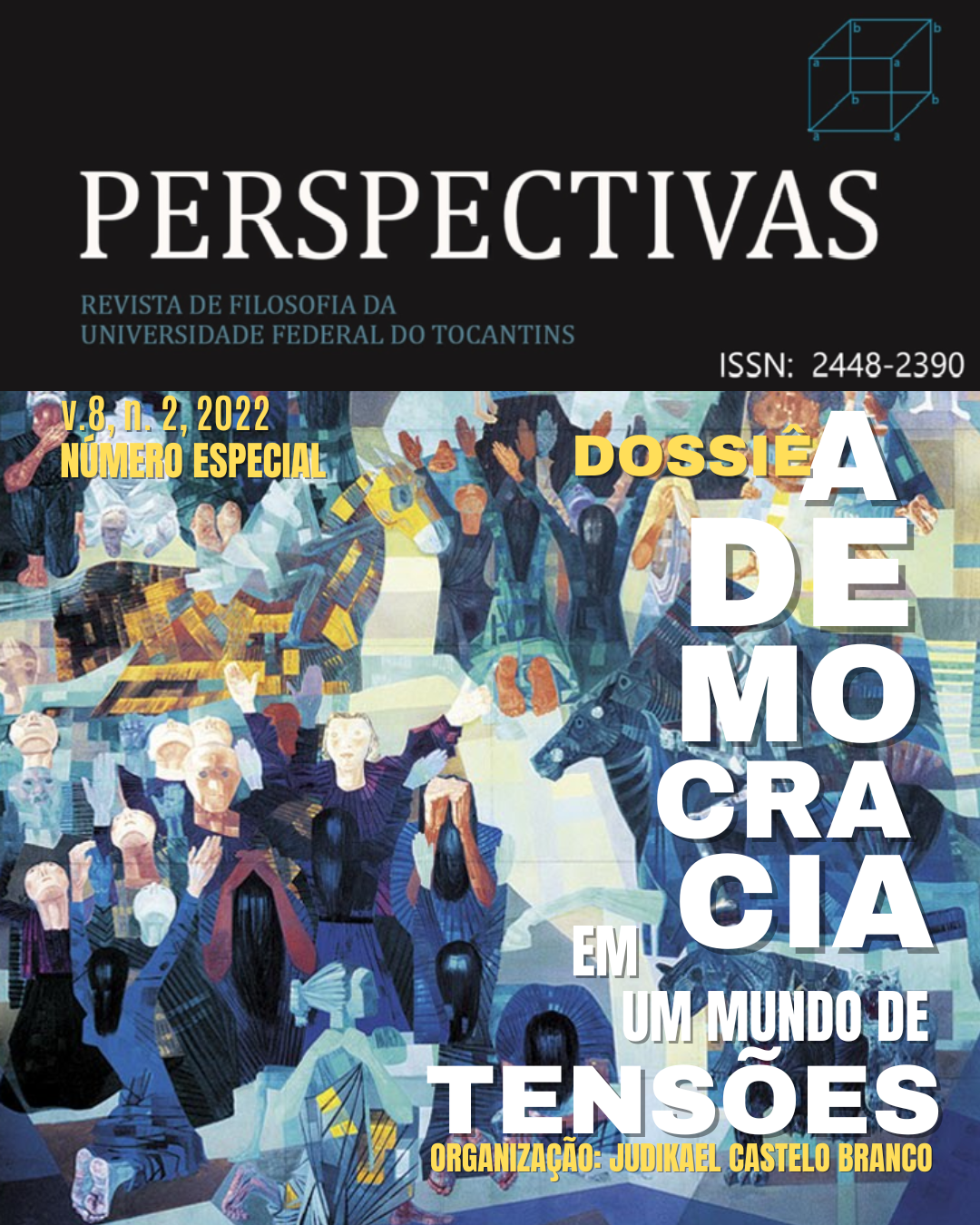Democracia liberal: crise ou ruptura/declínio?
DOI:
https://doi.org/10.20873.rpv8n2-76Palavras-chave:
Democracia, Consenso, Desacordo, Crise, RupturaResumo
Crise ou ruptura/declínio? Para alguns pesquisadores, a democracia continua a ter grande apelo, mas o compromisso com ela nem sempre é muito profundo. Esse baixo nível de comprometimento pode criar um ambiente de relativa tolerância para ações que distorcem ou quebram as regras da democracia. Pode abrir a porta para restrições à liberdade de expressão, uso excessivo do poder executivo ou mesmo intervenção militar na política. À vista disso, o modelo de democracia de equilíbrio é capaz de impedir a corrosão interna descrita por Steven Levitsky e Daniel Ziblatt, ou a falta de interesse em defendê-la em tempos de Amazon, internet e redes sociais, como parece sugerir David Runciman? Neste artigo, proponho uma abordagem da democracia liberal a partir da crítica de certa representação e ideia de democracia apresentada por pensadores críticos, em especial, o filósofo Jacques Rancière. Teóricos que enfatizaram a importância do desacordo e a natureza muitas vezes esporádica da política. Essas teorias se concentram em uma forte crítica das teorias e práticas democráticas minimalistas existentes. Rancière volta sua atenção crítica ao que ele chama de “democracia consensual”, tentativa de eliminar todas as formas de desacordo e, portanto, política, do corpo social. O desejo de democracia consensual é o desejo de uma política que eliminou a política democrática disruptiva, a ser substituída por administração apolítica e dominação privada, um desejo talvez sentido na tese do fim da história de Fukuyama e profundamente ligado à ideologia neoliberal.
Referências
ANDERSON, P. Brazil Apart: 1964-2019. London: Verso, 2019.
AVRITZER, L. Impasses da democracia no Brasil. Rio de Janeiro: Civilização Brasileira, 2016
AVRITZER, L. O pêndulo da democracia. São Paulo: Todavia, 2019.
BIGNOTTO, N. O Brasil à procura da democracia. Da proclamação da República ao século XXI (1889-2018). Rio de Janeiro: Bazar do Tempo, 2020.
BONAIUTI, G. La parte. Note sulla política del “popolo”. In: RANCIÈRE, J. Meridiana 77, In nome del popolo sovrano (2013), p. 145-174.
CASTELLS, M. Ruptura. A crise da democracia liberal. Trad. J. A. d’Ávila Melo. Rio de Janeiro: Zahar, 2018.
COHEN, J.; FUNG, A. Radical Democracy, Swiss Political Science Review 10 (4), (2004), pp. 23-34.
FUKUYAMA, F. Liberal Democracy as a Global Phenomenon (Political Science and Politics, Vol. 24, No. 4 (Dec., 1991), p. 659-664
FUKUYAMA, F. The End of History and the Last Man. New York: Free Press, 1991.
HEWLETT, N. Badiou, Balibar, Ranciere: Re-thinking Emancipation. London: Continuum, 2007.
LEVITSKY, S.; ZIBLATT, D. How Democracies Die. New York: Crown Publishing, 2018.
LIEVENS, M. Contesting Representation: Rancière on Democracy and Representative Government, Thesis Eleven 122, (2014), pp. 3-17.
LOREY, I. The 2011 Occupy Movements: Rancière and the Crisis of Democracy, Theory Culture & Society 31 (7/8), (2014), pp. 43–65.
MACPHERSON, C. B. The Life and Times of Liberal Democracy. Oxford: Oxford University Press, 1977.
MOUFFE, C. Por um populismo de esquerda. Trad. D. Mendonça. São Paulo: Autonomia Literária, 2020
PATEMAN, C. The Sexual Contract. Stanford University Press, 1988.
PRZEWORSKI, A. Crises da democracia. Trad. B. Vargas. Rio de Janeiro: Zahar, 2019.
RANCIÈRE, J. Dissensus on politics and aesthetics, p. 93.
RANCIÈRE, J. Dissensus on politics and aesthetics. Edited and translated by Steven Corcoran. London: Continuum, 2010, p. 92-8.
RANCIÈRE, J. La mésentente. Politique et philosophie, Paris, Galilée, 1995.
RANCIÈRE, J. O ódio à democracia. Trad. M. Echalar. São Paulo: Boitempo, 2014.
RANCIÈRE. J. La mésentente. Politique et philosophie.
RUNCIMAN, D. Como a democracia chega ao fim. Trad S. Flaksman. São Paulo: Todavia, 2019.
SASSEN, S. Expulsões. Brutalidade e complexidade na economia global. Trad. A. Freitas. Rio de Janeiro: Paz & Terra, 2016.
SAWARD, M. The Representative Claim. Contemporary Political Theory 5, (2006), pp. 297–318.
SCHMITTER, P. C. Crisis and Transition, but Not Decline in Democracy in Decline? Edited by Larry Diamond and Marc F. Plattner. Baltimore: Johns Hopkins University Press, 2015.
SENNETT, R. A corrosão do caráter. Consequências pessoais do trabalho no novo capitalismo. Trad. M. Santarrita. Rio de Janeiro: Record, 2021.
SENNETT, R. A cultura do novo capitalismo. Trad. C. Marques. Rio de Janeiro: Record, 2019.
SOARES, L. E. O Brasil e seu duplo. São Paulo: Todavia, 2019.
URBINATI, N.; WARREN, M. E. The Concept of Representation in Contemporary Democratic Theory. Annual Review of Political Science 11, (2008), p. 387–412.
WOLIN, S. S. Democracy Incorporated: Managed Democracy and the Specter of Inverted Totalitarianism. Princeton: Princeton University Press, 2008.
Downloads
Publicado
Como Citar
Edição
Seção
Licença
Copyright (c) 2023 Luiz Felipe Netto de Andrade e Silva Sahd

Este trabalho está licenciado sob uma licença Creative Commons Attribution 4.0 International License.
Os autores que publicam com esta revista concordam com os seguintes termos:
1. Autores mantêm os direitos concedidos à revista ou o direito de primeira publicação com o trabalho licenciado à Atribuição de Licença Creative Commons Atribuição 4.0 Internacional (CC BY 4.0) que permite o compartilhamento de trabalhos com reconhecimento de autoria e publicação inical nesta revista.
2. Autores têm permissão para aceitar contratos, distribuição não exclusiva da versão do trabalho publicada nesta revista (por exemplo, publicarem em repositório institucional ou como capítulo de livro) com reconhecimento de autoria e de publicação inicial nesta revista.
3. Autores têm permissão e são estimulados a publicar e distribuir o seu trabalho on-line (por exemplo, em repositório institucional ou em sua página pessoal) com as devidas referências à revista.





















